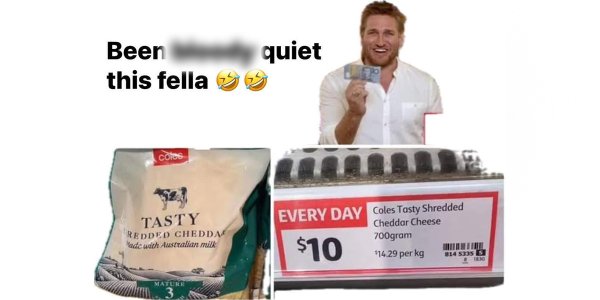Curtis Stone's old Coles ad becomes recipe for laughs amidst rising grocery bills
- Replies 11
It's no secret that Australians love a good laugh, especially when it comes to the quirks and quibbles of everyday life.
However, when a seven-year-old Coles advertisement featuring celebrity chef Curtis Stone recently resurfaced, it became the butt of jokes for a reason that's no laughing matter.
The ad in question, which first aired in 2017, shows the good-natured Chef Stone holding a crisp $10 note, promising viewers that this modest sum could cover a family meal.
Fast forward to today, and that same $10 would barely scratch the surface of a grocery bill, with some social media users jesting that it might just stretch to a single bag of shredded cheese from Coles.
The ad's reappearance on a social media group was met with a mix of nostalgia and biting sarcasm. The caption ‘Been b***** quiet this fella’ poked fun at Stone's absence from the conversation on current grocery prices, which have ballooned since the ad's optimistic days.

The supermarket launched the advertising campaign in 2010 and repeated it in 2017, starring Stone, originally from Melbourne but now living in California for 17 years. This suggested that there was no significant increase in checkout prices during that time.
The stark contrast between then and now has not been lost on Australians, who are feeling the pinch of inflation and the rising cost of groceries since 2020, driven by a mix of factors.
These factors include the COVID-19 pandemic, conflicts in Europe and the Middle East affecting supply chains, and unpredictable weather patterns impacting food production.
Back in 2017, Stone's Coles campaign was a testament to the supermarket's value, with recipes like a beef mince cottage pie that could be whipped up for under $10.
Yet, a report from last year revealed that the cost of the same ingredients had more than doubled to $24.62 by 2023.
Comments on the post ranged from humorous to frustrated, with one user quipping that a 'dry box of Nutri-Grain' might be the only dinner option within the $10 budget.
‘Can't even do sausages and bread for a tenner these days, two-minute noodles maybe,’ another remarked.
A third pointed out that ‘Stores like Coles and Woolworths are partly responsible for Australia's inflation rate. '
The situation became so dire that earlier this year, the Albanese government called for an ACCC inquiry into the supermarket sector to investigate allegations of price gouging.
A parliamentary investigation into supermarket prices released its final report on Tuesday, May 7, supporting legislation to dismantle major players in the grocery industry.
The Greens-led inquiry made 14 recommendations, including proposals for laws specifically targeting supermarkets, which would be implemented if they were found to abuse their market dominance.
While inquiry chair Nick McKim noted a recent dip in prices, he emphasised that ‘what we need is not just temporary falls in prices, we need to see food and grocery prices come down on a long-term basis in Australia’.
‘Taking together the recommendations we have made, we think they'll achieve that.’
You can watch Coles’ ad here:
Amidst ongoing debates about rising grocery prices, recent reports shed light on the significant impact of supermarket giants like Coles and Woolworths on the cost of living.
Celebrity chef Curtis Stone's involvement in advertising campaigns for these supermarkets highlights the efforts made to maintain consumer trust.
However, as discussions around inflation and market dominance continue, it's intriguing to reflect on historical grocery prices and how they compare to today's standards.
Delving into a vintage Woolworths advertisement provides a fascinating glimpse into past consumer habits and spending patterns, offering valuable insights into the evolving landscape of grocery shopping in Australia.
 Have you noticed a significant increase in your grocery bills? What strategies are you using to stretch your dollar further at the checkout? Join the discussion below and let's navigate these challenging times together.
Have you noticed a significant increase in your grocery bills? What strategies are you using to stretch your dollar further at the checkout? Join the discussion below and let's navigate these challenging times together.
However, when a seven-year-old Coles advertisement featuring celebrity chef Curtis Stone recently resurfaced, it became the butt of jokes for a reason that's no laughing matter.
The ad in question, which first aired in 2017, shows the good-natured Chef Stone holding a crisp $10 note, promising viewers that this modest sum could cover a family meal.
Fast forward to today, and that same $10 would barely scratch the surface of a grocery bill, with some social media users jesting that it might just stretch to a single bag of shredded cheese from Coles.
The ad's reappearance on a social media group was met with a mix of nostalgia and biting sarcasm. The caption ‘Been b***** quiet this fella’ poked fun at Stone's absence from the conversation on current grocery prices, which have ballooned since the ad's optimistic days.

Social media users mocked a seven-year-old Coles supermarket ad featuring celebrity chef Curtis Stone amidst Australia's current cost-of-living crisis. Credits: Facebook / Australian Memes
The supermarket launched the advertising campaign in 2010 and repeated it in 2017, starring Stone, originally from Melbourne but now living in California for 17 years. This suggested that there was no significant increase in checkout prices during that time.
The stark contrast between then and now has not been lost on Australians, who are feeling the pinch of inflation and the rising cost of groceries since 2020, driven by a mix of factors.
These factors include the COVID-19 pandemic, conflicts in Europe and the Middle East affecting supply chains, and unpredictable weather patterns impacting food production.
Back in 2017, Stone's Coles campaign was a testament to the supermarket's value, with recipes like a beef mince cottage pie that could be whipped up for under $10.
Yet, a report from last year revealed that the cost of the same ingredients had more than doubled to $24.62 by 2023.
Comments on the post ranged from humorous to frustrated, with one user quipping that a 'dry box of Nutri-Grain' might be the only dinner option within the $10 budget.
‘Can't even do sausages and bread for a tenner these days, two-minute noodles maybe,’ another remarked.
A third pointed out that ‘Stores like Coles and Woolworths are partly responsible for Australia's inflation rate. '
The situation became so dire that earlier this year, the Albanese government called for an ACCC inquiry into the supermarket sector to investigate allegations of price gouging.
A parliamentary investigation into supermarket prices released its final report on Tuesday, May 7, supporting legislation to dismantle major players in the grocery industry.
The Greens-led inquiry made 14 recommendations, including proposals for laws specifically targeting supermarkets, which would be implemented if they were found to abuse their market dominance.
While inquiry chair Nick McKim noted a recent dip in prices, he emphasised that ‘what we need is not just temporary falls in prices, we need to see food and grocery prices come down on a long-term basis in Australia’.
‘Taking together the recommendations we have made, we think they'll achieve that.’
You can watch Coles’ ad here:
Amidst ongoing debates about rising grocery prices, recent reports shed light on the significant impact of supermarket giants like Coles and Woolworths on the cost of living.
Celebrity chef Curtis Stone's involvement in advertising campaigns for these supermarkets highlights the efforts made to maintain consumer trust.
However, as discussions around inflation and market dominance continue, it's intriguing to reflect on historical grocery prices and how they compare to today's standards.
Delving into a vintage Woolworths advertisement provides a fascinating glimpse into past consumer habits and spending patterns, offering valuable insights into the evolving landscape of grocery shopping in Australia.
Key Takeaways
- A seven-year-old Coles supermarket ad featuring celebrity chef Curtis Stone was mocked on social media due to Australia's current cost-of-living crisis.
- The ad, which claimed families could feed themselves for $10, seemed out of touch as grocery prices have risen sharply since then.
- Inflation and various global factors contributed to the significant increase in food prices since the ad campaign.
- A parliamentary inquiry made recommendations aimed at reducing supermarket prices in the long term, including proposing divestiture laws to address market power misuse.







